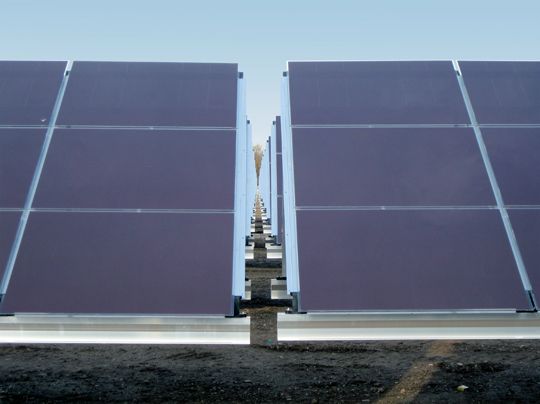ANAHEIM, Calif. -- After production began this past summer, Masdar PV is now seeing the first installation that uses its amorphous-silicon thin films.
Munich-based Solar Werke is building the 1-megawatt project for Beton Fertigteilbau Erfurt (BFE), and it expects to complete the ground-mounted array by the end of the year. BEF was a concrete supplier for Masdar PV.
The project is a milestone for Masdar PV, which represents the government of Abu Dhabi's foray into solar equipment manufacturing. Abu Dhabi, part of the United Arab Emirates, is spending billions to turn itself into a producer of clean energy, a move to secure the future of the country's economy when oil runs out.
Abu Dhabi discussed its plan to enter the solar market in May 2008, and promised to spend about $600 million to build two factories, one in Germany and one in Abu Dhabi.
-
Where Will DOE’s Loan Program Make the Next Climate Tech Investments?
48
-
What the Frack Is Happening With Natural Gas Prices?
15
-
With an Energy Crisis Brewing, No Peak in Sight for Emissions
9
A month later, the emirate announced Rainer Gegenwart's appointment to the chief executive post. He was vice president of business development and technology at a company that later became Colexon Energy. Previously, he was in charged of starting First Solar's operation in Germany.
Masdar PV entered production during a downturn, and that has forced the company to re-examine its near-term strategy, Gegenwart said at Solar Power International in Anaheim this week.
The market has shifted from a supplier to a customer market as solar companies produced way more equipment than what the market could absorb. Manufacturers have slashed their solar panel prices by about 40 percent over the past year.
"Negotiating for long-term supply contracts was impossible because you didn't know how the market or prices would develop," Gegenwart said. The market dynamics put a premium on having a strong sales team, he added.
The pricing has stabilized, he said. Company executives and analysts generally expect demand to perk up in 2010, though opinions vary on how soon and in what volumes.
Masdar PV is running two shifts six days a week at its factory, which is capable of producing 65 megawatts of solar panels per year, Gegenwart said. The plan is to expand the production to 85 megawatts by 2011. The Abu Dhabi factory, at 65 megawatts, could be built in 2010, though that depends on how well the market will have recovered.
The company is shipping panels with 6 percent to 6.6 percent efficiency. The panels make use of a layer of amorphous silicon to convert sunlight into electricity. Next year, it plans to start making panels with two layers of amorphous silicon, and Gegenwart expects the efficiency to fall between 7 percent to 7.8 percent.
The plan is to roll out panels with a layer of amorphous silicon and a layer of microcrystalline silicon – which would push the efficiency to 9 percent, in 2011, he said.
Advocates of amorphous silicon technology say its lower efficiency – compared with silicon panels with efficiencies in the mid-teens – is offset by its ability to make use of low light. Skeptics say the low efficiency simply makes the technology far less competitive (see Amorphous Silicon: Losing the Shakeout?).
Gegenwart declined to disclose the manufacturing costs, except to say that "it's way less than $2 per watt." Some silicon panel suppliers are making their products at around $2 per watt.
The company is making solar panels with equipment from Applied Materials. Masdar PV also sourced equipment from other vendors to improve production and set itself apart from other Applied's customers, Gegenwart said.
Applied's tools could make giant, 5.7 square-meter panels that are eight times the size of First Solar's thin films, which use cadmium-telluride instead of amorphous silicon. But Masdar PV isn't shipping panels that size. Instead, it's shipping the quarter-size panels to meet customers' demand, Gegenwart said. He said the company expects to start shipping the half-size version in 2010.
Applied has touted its full-size panels as an advantage for large-scale installations. But the products haven't found a warm reception. Handling such large panels is one concern. The panels also require installers to design or find mounting systems designed to handle the dimensions and weight (see Applied Materials Designs Mounting System for Supersized Panels).
Gegenwart pointed out that the full-size panels are so different from others on the market that it requires time for installers to embrace it.
Manufacturing isn't the only focus for Masdar PV. The company also wants to be a project developer so that it could create opportunities for its customers, Gegenwart said. The company has started to explore project development opportunities in Germany, but no in the United States.

Masdar PV has installed its first solar modules in the solar power plant by BFE in Efurt.
